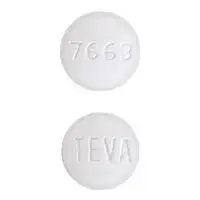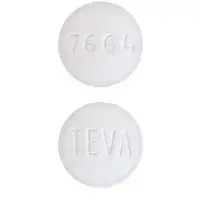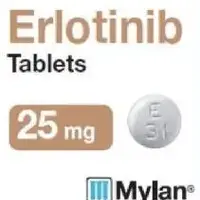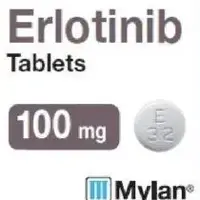Generic name: erlotinib
Drug class: EGFR inhibitors
Dosage form: oral tablet
Availability: Prescription only
Pregnancy & Lactation: Risk data available
Brand names: Tarceva
What is Erlotinib?
Erlotinib is a type of targeted therapy used to treat cancer.
Erlotinib is a tyrosine kinase inhibitor that works by blocking the kinase activity of a protein called epidermal growth factor receptor (EGFR), which is involved in cell growth and survival.
EGFR is found on the surface of normal and cancerous cells. Sometimes normal versions of the EGFR protein can contribute to the development of cancer, but in other cases mutations can occur in the EGFR protein, which enable cancer cells to grow, divide and spread faster.
Erlotinib is used to treat pancreatic cancer and non-small cell lung cancer (NSCLC). It is only used to treat cases of NSCLC that have specific mutations in their EGRF protein - exon 19 deletions or exon 21 substitution mutations.
Erlotinib was first approved by the US Food and Drug Administration (FDA) in 2004. It is available under the brand name Tarceva and also as a generic tablet.
What is erlotinib used for?
Erlotinib is a prescription medication used:
- For the treatment of patients with metastatic (cancer that has spread) NSCLC whose tumors have EGFR exon 19 deletions or exon 21 (L858R) substitution mutations who are receiving first-line, maintenance, or second or greater line treatment after progression following at least one prior chemotherapy regimen.
- You healthcare provider will use an FDA-approved test to check if you have one of these mutations. The safety and efficacy of erlotinib has not been established in patients with NSCLC whose tumors have other EGFR mutations.
- In combination with gemcitabine in patients with advanced-stage pancreatic cancer whose cancer has spread, grown, or cannot be surgically removed and who have not received previous chemotherapy (first-line).
Erlotinib tablets are not recommended for use in combination with platinum- based chemotherapy.
Related/similar drugs
Opdivo, Retevmo, Rybrevant, Lumakras, methotrexate, Keytruda, AvastinWarnings
Erlotinib can cause serious side effects, including
- Lung problems called interstitial lung disease events. Erlotinib has been shown to cause lung problems, including death. Symptoms of lung problems may include shortness of breath, cough, and fever. Erlotinib may need to be stopped if you have any of these symptoms.
- Liver and kidney problems. Erlotinib has been shown to cause severe kidney and liver problems, including death. Some people had their kidneys and liver stop working. Let your healthcare provider know if you have a history of liver or kidney disease.
- Stomach and intestinal problems called gastrointestinal perforation. Erlotinib has been shown to cause gastrointestinal perforation, which has led to death. A gastrointestinal perforation is a hole that develops in your stomach or intestine. Erlotinib patients may be at a higher risk for gastrointestinal perforation if they:
- Are taking medicines including those that may help block the growth of blood vessels; steroids; non-steroidal anti-inflammatory drugs (NSAIDs); and certain chemotherapies. Always tell your healthcare provider about any medicines you are taking.
- Have a history of ulcers or other stomach disease.
- Serious skin conditions. Erlotinib has been shown to cause blistering and skin peeling. This may result in other serious skin disorders or death.
- Blood, bleeding, and clotting problems. Erlotinib has been shown to cause certain blood problems and other bleeding and clotting problems. These have led to stroke and death.
- Eye disorders. Erlotinib has been shown to cause dry eyes, unusual eyelash growth, or swelling of the cornea. The cornea is the clear coating of the eyeball. This swelling may irritate or damage the eye.
- Bleeding events when taking warfarin with erlotinib. Tell your healthcare provider if you are taking a blood thinner, such as warfarin. Taking erlotinib with this medicine can cause death.
- Pregnancy. Erlotinib can harm an unborn baby. Women should use effective birth control during treatment and for at least 1 month after the last dose of erlotinib. Tell your healthcare provider if you have become pregnant, or if you think you may be pregnant, during treatment with erlotinib. Do not breast-feed during treatment with erlotinib and for 2 weeks after the final dose.
Call your healthcare provider if you experience the following while taking erlotinib:
- Serious or ongoing diarrhea, nausea (feeling sick to your stomach), loss of appetite, or vomiting.
- New or worsening shortness of breath or cough.
- Eye irritation.
- New or worsening rash, blistering, or peeling of the skin.
- Any changes in smoking habits.
How should I take Erlotinib
- Take erlotinib tablets exactly as prescribed by your healthcare provider.
- Take erlotinib once daily.
- Take erlotinib on an empty stomach, one hour before food or two hours after food.
Dosing information
The recommended dose of erlotinib is:
- 150 mg once daily in patients with NSCLC.
- 100 mg once daily in patients with pancreatic cancer.
Erlotinib should be taken on an empty stomach.
Before Taking
Do not take erlotinib if you are allergic to erlotinib or any of the ingredients in it. See below for a complete list of ingredients.
What should I tell my doctor before taking erlotinib?
Before you take erlotinib, tell your doctor about all of your medical conditions.
Tell your doctor if you smoke before starting erlotinib.
What should I know about storage and disposal of this medication?
Keep this medication in the container it came in, tightly closed, and out of reach of children. Store it at room temperature and away from excess heat and moisture (not in the bathroom).
Unneeded medications should be disposed of in special ways to ensure that pets, children, and other people cannot consume them. However, you should not flush this medication down the toilet. Instead, the best way to dispose of your medication is through a medicine take-back program. Talk to your pharmacist or contact your local garbage/recycling department to learn about take-back programs in your community. See the FDA's Safe Disposal of Medicines website (http://goo.gl/c4Rm4p) for more information if you do not have access to a take-back program.
It is important to keep all medication out of sight and reach of children as many containers (such as weekly pill minders and those for eye drops, creams, patches, and inhalers) are not child-resistant and young children can open them easily. To protect young children from poisoning, always lock safety caps and immediately place the medication in a safe location – one that is up and away and out of their sight and reach. http://www.upandaway.org
What special dietary instructions should I follow?
Avoid eating grapefruit and drinking grapefruit juice while taking this medicine.
To prevent diarrhea that may be caused by erlotinib, drink small sips of a liquid such as a sugar-free sports drink often throughout the day, eat mild foods such as crackers and toast, and avoid spicy foods.
What should I avoid while using Erlotinib?
- Erlotinib can cause a rash that can occur or get worse when exposed to sunlight. Avoid being out in the sun if it causes a rash.
- Avoid smoking while taking erlotinib. Your treatment with erlotinib may need to be adjusted if you smoke. Talk with your healthcare provider if you smoke while taking erlotinib.
Erlotinib side effects
Erlotinib can cause serious side effects including:
- See "Important information" above.
Erlotinib can cause skin, hair and nail problems:
- While taking erlotinib a rash could appear or get worse if the skin is exposed to the sun. You may want to use alcohol-free lotions and sunscreens or avoid being out in the sun.
- Your skin and nails may get darker while taking erlotinib. You may also have dry skin that may or may not crack. This most often happens with rash.
- You may get more hairy and develop brittle or loose nails.
The most common side effects of erlotinib in patients with NSCLC who had not received previous chemotherapy are:
- diarrhea
- weakness
- rash
- cough
- shortness of breath
- loss of appetite (not wanting to eat)
The most common side effects of erlotinib in patients with NSCLC receiving it as maintenance, 2nd or 3rd line therapy are:
- rash
- diarrhea
The most common side effects of erlotinib in patients with pancreatic cancer are:
- fatigue (feeling very tired)
- rash
- nausea
- loss of appetite
- diarrhea
These are not all of the possible side effects with erlotinib. Call your doctor for medical advice about side effects. Talk to your doctor about any side effects that bother you or do not go away.
You may report side effects to the FDA at (800) FDA-1088 or www.fda.gov/medwatch. You may also report side effects to Genentech at (888) 835-2555.
See more: Erlotinib Side EffectsWhat other drugs will affect Erlotinib?
Erlotinib can interact with a number of other medications. You may need to adjust the dose or timing of erlotinib or your other medications. Tell your healthcare provider about all the medicines you take, including prescription and over-the-counter medicines, vitamins, and herbal supplements.
Talk to your healthcare provider before taking any new medicines or supplements.
Do not eat grapefruit or drink grapefruit juice before talking with your healthcare provider.
What other information should I know?
Keep all appointments with your doctor and the laboratory. Your doctor may order certain lab tests to check your body's response to erlotinib.
Do not let anyone else take your medication. Ask your pharmacist any questions you have about refilling your prescription.
It is important for you to keep a written list of all of the prescription and nonprescription (over-the-counter) medicines you are taking, as well as any products such as vitamins, minerals, or other dietary supplements. You should bring this list with you each time you visit a doctor or if you are admitted to a hospital. It is also important information to carry with you in case of emergencies.







